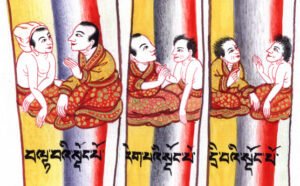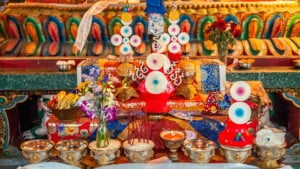
Noble Caring after Receiving a Diagnosis
Samye’s NLNCND team coordinator, Andrea Sherman, has written a poignant and very helpful article about her approach to a new diagnosis.

Samye’s NLNCND team coordinator, Andrea Sherman, has written a poignant and very helpful article about her approach to a new diagnosis.

Many students ask questions about how to set up a proper Tukdrup Barché Kunsel shrine for group practice or at home. Phakchok Rinpoche has kindly requested his artist to prepare detailed diagrams that we may follow.

Rituals at Tibetan Buddhist Dharma Centers can delight, intrigue, and/or confuse newcomers. Here we offer some brief guidelines for the curious onlooker.

As social beings, we humans learn from those around us. And because we don’t have fixed, unchanging solidity as beings, we make choices. We can choose to follow our innate goodness. If we associate with loving, kind, and open-hearted people, we will naturally develop those qualities. When we acknowledge our basic goodness, we lean toward virtue and surround ourselves with others who share that view.

As social beings, we humans learn from those around us. And because we don’t have fixed, unchanging solidity as beings, we make choices. We can choose to follow our innate goodness. If we associate with loving, kind, and open-hearted people, we will naturally develop those qualities. When we acknowledge our basic goodness, we lean toward virtue and surround ourselves with others who share that view.

As social beings, we humans learn from those around us. And because we don’t have fixed, unchanging solidity as beings, we make choices. We can choose to follow our innate goodness. If we associate with loving, kind, and open-hearted people, we will naturally develop those qualities. When we acknowledge our basic goodness, we lean toward virtue and surround ourselves with others who share that view.

Jealousy sneaks up on us in many ways and it can be a tricky mental state to isolate. The Tibetan term (phrag dog) is a translation from the Sanskrit word Īrṣyā. According to the Mahayana Abhidharma, jealousy is one of the subsidiary unwholesome mental factors. The Indian and Tibetan words encompass two separate English terms: jealousy and envy. Jealousy derives from the negative emotion of anger or ill will. Envy also may manifest as resentment or anger, but it may also be mixed with attachment or greed.

Although some readers might believe Buddhism and business have little to do with one another, history shows us a different story. The Buddha himself taught merchants and rulers, and members of the merchant class aided in spreading the teachings throughout Asia. Buddhist teachers and rulers recognized that laypeople need to take or give loans and to exchange commercial goods. But in doing so, we can be expected to conform to standards of fairness, honesty, and compassion in our interactions.

In this article, Hilary Herdman continues her exploration of the Sixteen Principles of Societal Human Values.

In this article, Hilary Herdman continues her exploration of the Sixteen Principles of Societal Human Values.

Hilary Herdman discusses Songtsen Gampo’s advice in choosing suitable role models.

Phakchok Rinpoche shares stories of the miraculous birth of Guru Rinpoche, the Lotus-born Master of Uḍḍiyāna.
To receive the latest teachings and information from Samye Institute, including Phakchok Rinpoche’s monthly Guru Rinpoche Day message our Dakini Day Digest.
There was a problem reporting this post.
Please confirm you want to block this member.
You will no longer be able to:
Please allow a few minutes for this process to complete.

